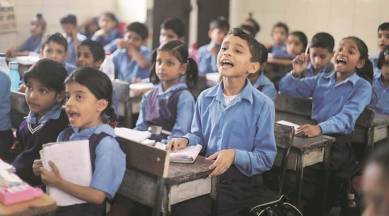Stay updated with the latest - Click here to follow us on Instagram
Say move threatens existence of govt schools: School management, teachers bodies oppose Gujarat govt’s proposed PPP mode of schools
The Gujarat Education Department has proposed to start four different types of schools—Gyan Setu Day Schools, Gyan Setu Residential School, Gyan Shakti Residential Schools and Raksha Shakti Residential Schools—from Class 6 onwards in the upcoming academic session of 2023-24.

Various school managements, teachers and principal associations in Gujarat have joined hands to oppose the state government’s move to introduce four school schemes under the public private partnership (PPP) mode. The move, they say, will affect around 1.68 lakh government school students annually and pose a threat to the district panchayat government schools in the state.
A representation of the state secondary teachers association, higher secondary teachers association, principals association, non-teaching staff association, government primary teachers association and management associations of private and grant-in-aid schools are scheduled to meet the state Minister for Primary, Secondary and Adult Education, Kuber Dindor, Monday to voice their concerns.
monthly limit of free stories.
with an Express account.
The Gujarat Education Department has proposed to start four different types of schools—Gyan Setu Day Schools, Gyan Setu Residential School, Gyan Shakti Residential Schools and Raksha Shakti Residential Schools—from Class 6 onwards in the upcoming academic session of 2023-24.
According to the school managements association, Gujarat Rajya Shala Sanchalak Mahamandal, around 1.68 lakh students will be diverted from government to the PPP mode schools every year in Class 6 as part of the new scheme. “Already the district panchayat government schools that are on the death bed will be closed down in the coming six to seven years,” Bhaskar Patel, president of Gujarat Rajya Shala Sanchalak Mahamandal, told The Indian Express.
“With the loss of students, under one class-one teacher formula for district panchayat and municipal schools, nearly 500 teachers will lose their jobs. Between 2023 and 2026, 1,500 classes from 6-8 will be closed and 1,500 teachers of these classes will lose their jobs. Similarly, between 2026 and 2028, 2,000 secondary teachers across 1,000 classes of 9 and 10 will lose their jobs benefitting grant-in-aid schools. Similarly in 2028-30, for Classes 11 and 12, 1,000 students and 3,000 teaching and non-teaching staff (will lose jobs). Subsequently, Classes 9-12 will be closed. There will be no recruitment in grant-in-aid secondary and higher secondary schools,” the representation stated.
Patel said no opinion was sought from the associations before announcing the schools. “With this move, the entire education in Gujarat from Class 6-12 will be in private hands.”
The associations also alleged that the government wants to withdraw its support from district panchayat and corporation-run schools and support private schools. Also, under the Right to Education Act, the government cannot conduct entrance examinations for Class 6 students for admission in these schools, Patel added.
After proposing the Gyan Setu Residential Schools on PPP mode, the Gujarat education department proposed ‘Gyan Setu Day Schools’ on a similar model. In the first year, 400 schools across the state were to be set up—a minimum of 10 in each district and one in each taluka and municipal corporation. The 400 schools will have 1,600 students—40 in each school—from the upcoming academic session.
The Raksha Shakti Residential Schools scheme will have one such school in each of the 33 districts and six municipal corporation areas, ie, 40 schools with a total of 16,000 students—with each school having 400 students. On the other hand, 40 Gyan Shakti Residential Schools across the state will have 1,600 students.
Under the scheme, the state government will reimburse Rs 60,000 per student per year for residential schools and Rs 20,000 for day schools.